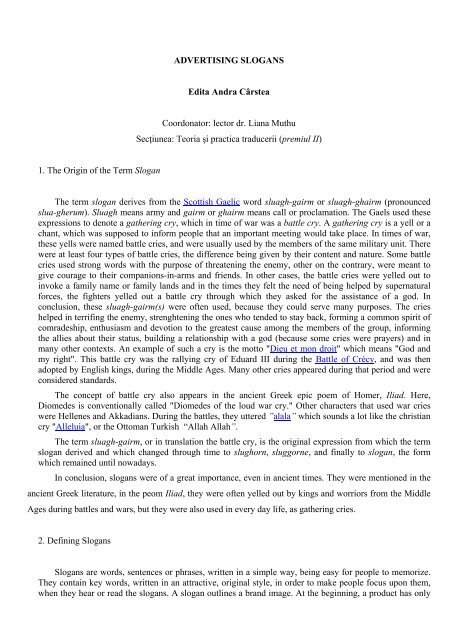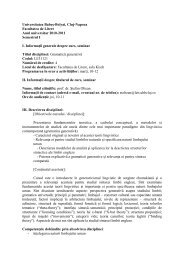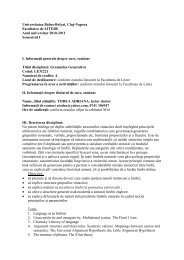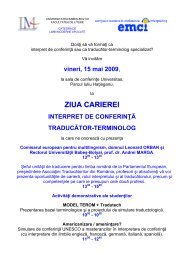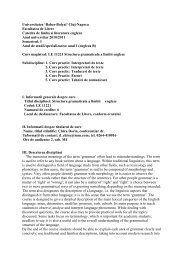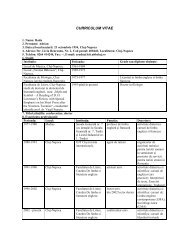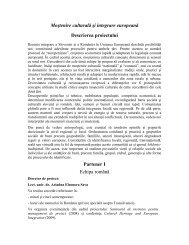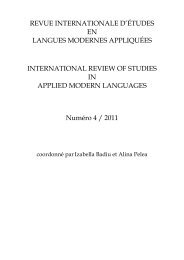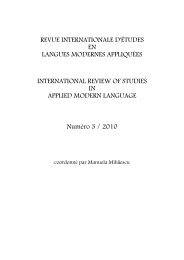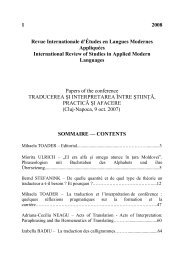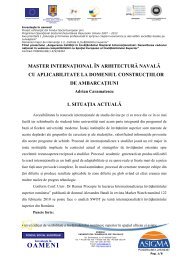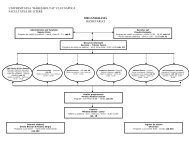Dimensiuni ale limbajului n context carceral
Dimensiuni ale limbajului n context carceral
Dimensiuni ale limbajului n context carceral
Create successful ePaper yourself
Turn your PDF publications into a flip-book with our unique Google optimized e-Paper software.
1. The Origin of the Term Slogan<br />
ADVERTISING SLOGANS<br />
Edita Andra Cârstea<br />
Coordonator: lector dr. Liana Muthu<br />
Secţiunea: Teoria şi practica traducerii (premiul II)<br />
The term slogan derives from the Scottish Gaelic word sluagh-gairm or sluagh-ghairm (pronounced<br />
slua-gherum). Sluagh means army and gairm or ghairm means call or proclamation. The Gaels used these<br />
expressions to denote a gathering cry, which in time of war was a battle cry. A gathering cry is a yell or a<br />
chant, which was supposed to inform people that an important meeting would take place. In times of war,<br />
these yells were named battle cries, and were usually used by the members of the same military unit. There<br />
were at least four types of battle cries, the difference being given by their content and nature. Some battle<br />
cries used strong words with the purpose of threatening the enemy, other on the contrary, were meant to<br />
give courage to their companions-in-arms and friends. In other cases, the battle cries were yelled out to<br />
invoke a family name or family lands and in the times they felt the need of being helped by supernatural<br />
forces, the fighters yelled out a battle cry through which they asked for the assistance of a god. In<br />
conclusion, these sluagh-gairm(s) were often used, because they could serve many purposes. The cries<br />
helped in terrifing the enemy, strenghtening the ones who tended to stay back, forming a common spirit of<br />
comradeship, enthusiasm and devotion to the greatest cause among the members of the group, informing<br />
the allies about their status, building a relationship with a god (because some cries were prayers) and in<br />
many other <strong>context</strong>s. An example of such a cry is the motto "Dieu et mon droit" which means "God and<br />
my right". This battle cry was the rallying cry of Eduard III during the Battle of Crécy, and was then<br />
adopted by English kings, during the Middle Ages. Many other cries appeared during that period and were<br />
considered standards.<br />
The concept of battle cry also appears in the ancient Greek epic poem of Homer, Iliad. Here,<br />
Diomedes is conventionally called "Diomedes of the loud war cry." Other characters that used war cries<br />
were Hellenes and Akkadians. During the battles, they uttered ”alala” which sounds a lot like the christian<br />
cry "Alleluia", or the Ottoman Turkish “Allah Allah”.<br />
The term sluagh-gairm, or in translation the battle cry, is the original expression from which the term<br />
slogan derived and which changed through time to slughorn, sluggorne, and finally to slogan, the form<br />
which remained until nowadays.<br />
In conclusion, slogans were of a great importance, even in ancient times. They were mentioned in the<br />
ancient Greek literature, in the peom Iliad, they were often yelled out by kings and worriors from the Middle<br />
Ages during battles and wars, but they were also used in every day life, as gathering cries.<br />
2. Defining Slogans<br />
Slogans are words, sentences or phrases, written in a simple way, being easy for people to memorize.<br />
They contain key words, written in an attractive, original style, in order to make people focus upon them,<br />
when they hear or read the slogans. A slogan outlines a brand image. At the beginning, a product has only


